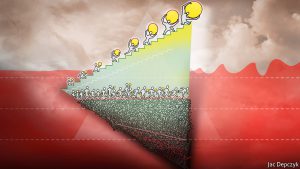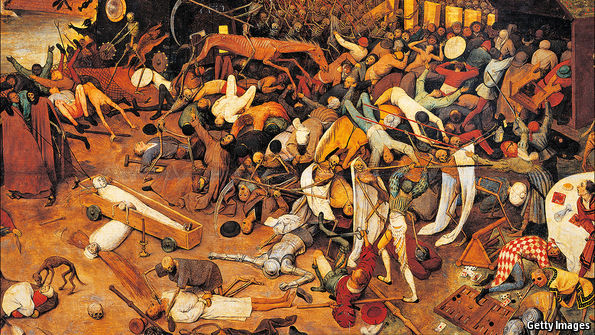The Economist の記事を訳出しました。
The next to blow: Britain’s constitutional time-bomb
原文はこちらから読めます。
次の一撃
イギリスの憲法という名の時限爆弾
ブレグジットはすでに政治的な危機をもたらしている。遅かれ早かれそれは憲法上の危機をもたらすことにもなるだろう。

英国人は自分たちの「条文化されていない」憲法に誇りを持っている。アメリカ、フランス、ドイツはルールを白黒はっきり定める必要がある。議会発祥の地たる英国は、アイルランドの独立を除けば、クーデター、革命、内戦を免れ、300年以上にわたって民主主義を謳歌してきた。その政治は、主権のある議会の下で発展する一連の伝統、慣習および法律によって統治されている。その安定性によって、イギリスは、その統治方法が何世紀にもわたってコモン・センスにより適応されてきた強固な基盤の上に築かれていると世界を確信させた。
その見解は時代遅れだ。情け容赦のないブレグジットの論理はイギリスの地に憲法という名のダイナマイトを突き差した—そして、世論が分断された国における憲法改革の困難を考えると、ダイナマイトを無効化するためにできることはほとんどない。適応性があり堅固であると彼らが信頼していた憲法が実際は混乱、分裂および連合に対する脅威を増幅する可能性があることに英国人が遠からぬうちに気づく可能性は高い。
テリーザ・メイが保守党党首を辞任してから3日後の6月10日に、彼女の後継争いが正式に開始される。本命のボリス・ジョンソンを含む何人かの候補者は、EUが彼らに彼らが望むものを与えない限り(EUは望んでいないわけだが)、交渉なしで10月31日にEUから撤退すると誓っている。次の首相に、控えめに言っても、代表的とは言い難い人物を任命することになる保守党の124,000人のメンバーは、こうして国を真っ二つにした問題を自分たちで解決しようとするだろう。
さらに悪いことに、英国の主権を持つはずの議会は、それが国に重大な害を及ぼすであろうという理由で、まさしくそのような交渉なきブレグジットに反対票を投じた。交渉なきブレグジットをやめさせたり、強制的に可決させたりするための議会の策謀がより増えるだろう。憲法は、行政府と議会のどちらが勝るべきかについて明確に規定していない。どのように選択するかさえもはっきりしない。
この不確実性の背後にあるのは、英国の憲法が、無数の法律、慣習、および規則にまたがって散在する矛盾の寄せ集めであるという事実だ。今週号のブリーフィングが説明するように、これらは議会での投票によって、あるいは今週、議会の声が届くことを確実にするために議長に留まることを誓い論争を呼んだ庶民院の議長の権限によって簡単に修正することができる。英国議員のほとんどが、規則に則った上で素早くてもぞんざいに行動することが民主主義を台無しにする可能性があることに注意を払っていた時代があった。おそらくそれこそが、彼らがかつて自制を実践していた理由だ。しかし、自由主義的な民主主義が揺るぎないものと思われたこの数十年間、英国の指導者たちは注意を怠っていた。その代わりに、彼らは健忘症の発作を起こして、憲法の卸売りを再びでっち上げようとした。
トニー・ブレアとデイビッド・キャメロンの下、ウェストミンスター議会は、スコットランド、ウェールズと北アイルランドの議会に、そして国民投票を通じて直接その国民に、権限を与えた。これらの刷新は、多くの場合、十分に意味のあるものであり、それ自体望ましいものだった。しかし、憲法全体に対する影響については、誰も考えていなかった。
結果として生じた混乱の烙印が、すでにブレグジットには押されている。国民投票はEU離脱を支持したが、詳細については後回しにした。国民投票はブレグジットに信任を与えたが、ブレグジットが取りうる非常に多様な形のいずれかに与えられたわけではなかった。国民投票を尊重する義務と、国民一人ひとりの利益のために最善を尽くして行動するという議員の義務を、議員がどのように調和させるのかは明らかではない。他の国はその過ちを回避している。アイルランドも国民投票をしている。しかし、その憲法第46条はより明確だ。アイルランドの人々は、詳細が明らかな状態で法案がドイル・エアランを通過してはじめて修正に投票する。イギリスにはそこまでの思慮深さはなかった。
ブレグジットはそれ自体、連合の完全性を脅かすことによって、さらなる憲法上の混乱の種を蒔いている。欧州議会の選挙では、スコットランド国民党(SNP)が票を伸ばした。スコットランドは国民投票でEU残留に投票したので、SNPの指導者たちがイギリスから独立するためのさらなる信任を勝ち取ったと主張することは理解できる。それでも、保守党の党首候補の少なくとも1人は、さらなる国民投票を否定している。
離脱のためのプロセスが定められていないという理由だけで、連合を解散することは憲法上の悪夢になるだろう。スコットランドで2度目の国民投票を実施するだけでは不安が残る。ジョンソン氏は国境の北方では支持されていない。多くの英国の有権者が2回目のブレグジット国民投票を求めている。メイ氏は、ブレグジットが決議されるまで待つようSNPに伝えた。ジョンソン首相は、決意の固いスコットランドの運動に対して合法的に立場を維持することができるだろうか? それはわからない。
EUを去るという行為自体がまた、憲法に新たな疑問を投げかけるだろう。EU市民の法的権利を保証する基本権憲章は、もはや英国の裁判所の決定基準になることはないだろう。ドミニク・ラーブなどの、一部の保守党の党首候補は、これらの権利を組み込んだ国内法を廃止したいと考えている。議会が抑圧的な新しい法律を可決した場合、裁判所は文句を言うかもしれないが、彼らはそれを止めることができないだろう。ヨーロッパの裁判官を混乱させることを快く思わない有権者は、考え直し始めるかもしれない。英国の権利章典にお呼びがかかり、もう一つの思慮の浅い憲法刷新の発作の出番となる。
そしてそれは最後の心配につながる。イギリスのぼろぼろの、安易に修正された憲法は、ブレグジットについて論争して過ごした3年間が生み出した急進的な政治に対して脆弱だ。極左のジェレミー・コービンとその仲間は、イギリスに革命を起こすという彼らの野心についてこれ以上ないほど明確に打ち出している。彼らが経済と公共支出にフォーカスするだろうと単純に信じることはできないが、規則だけは例外だ。コービン氏の下の労働党政権—あるいは、その点で言えば、ポピュリストの保守党が率いる保守政権—は、議会でやりたいようにできる能力によってのみ制約を受けるだろう。労働党はすでに憲法制定会議を求めている。
ほとんどの英国人は、軽率にも待ち受ける試練に気がついていないように見える。おそらく彼らは、彼ら独自のやり方が常に安定につながると信じている。彼らの憲法の無限の柔軟性が妥協の余地を与え、その国をブレグジットという不毛の地から抜け出させることは確かに起こりうる。しかし、おそらくそれ以上に、それは他の多くが詐欺師と裏切り者であるという主張をもたらすだろう。
ブレグジットは長い間政治的危機にあった。いまそれは憲法上の危機になる運命にもあるようだ。それに対してイギリスは哀れなまでに準備が整っていない。
| 2019/06/08
| Translation
|
Free exchange
A new anthology of essays reconsiders Thomas Piketty’s “Capital”
from The Economist

Thomas Piketty
Capital in the Twenty-First Century (2013)
– focuses on wealth and income inequality in Europe and the US since the 18th century.
– The central thesis is that inequality is not an accident but rather a feature of capitalism that can be reversed only through state intervention.
– argues that unless capitalism is reformed, the very democratic order will be threatened.
– reached number one on The New York Times bestselling hardcover nonfiction list from 18 May 2014.
– offers a possible remedy: a global tax on wealth.
The book’s central thesis is that when the rate of return on capital (r) is greater than the rate of economic growth (g) over the long term, the result is concentration of wealth, and this unequal distribution of wealth causes social and economic instability.
r > g: the rate of return on capital, r, has historically been greater than g, the growth rate of the economy.
Why does this matter?
1) the ratio of an economy’s wealth to its output tends to rise
=> which increases the relative economic power of wealth in society.
2) because the distribution of wealth is usually less equal than the distribution of income, faster growth in wealth than in GDP means a steady increase in inequality.
3) income from capital will grow as a share of income (and income from labour will fall).
So being born rich (or marrying well) becomes a surer route to success than working hard or starting a firm.
=> It is a recipe for social stagnation, and perhaps crisis.
Piketty proposes a global system of progressive wealth taxes to help reduce inequality and avoid the vast majority of wealth coming under the control of a tiny minority.
A trend towards higher inequality was reversed between 1930 and 1975 due to unique circumstances:
– the two world wars,
– the Great Depression
– a debt-fueled recession
=> destroyed much wealth owned by the elite.
=> prompted governments to undertake steps towards redistributing income (especially in the post-World War II period)
The fast, worldwide economic growth of that time
– reduced the importance of inherited wealth in the global economy.
The world today is returning towards “patrimonial capitalism”
– much of the economy is dominated by inherited wealth:
– the power of this economic class is increasing, threatening to create an oligarchy.
Piketty cites novels by
– Honoré de Balzac,
– Jane Austen
– Henry James
=> to describe the rigid class structure based on accumulated capital that existed in England and France in the early 1800s.
Piketty proposes that
– a progressive annual global wealth tax of up to 2%,
– combined with a progressive income tax reaching as high as 80%,
=> would reduce inequality,
=> “politically impossible”
Piketty predicts
– the growth rate will once again fall below the rate of return,
– the twentieth century will be an aberration in terms of inequality.
– Without tax adjustment, economic growth will be lower and inequality will be higher.
– over long periods of time, the average return on investment outpaces productivity-based income by a wide margin.
Piketty dismisses the idea that
– bursts of productivity resulting from technological advances can be relied on to return sustained economic growth;
– “a more just and rational order” to arise based on “caprices of technology,”
– return on investment can increase when technology can be substituted for people.
After Piketty: The Agenda for Economics and Inequality
edited by Heather Boushey, Bradford DeLong and Marshall Steinbaum
– a book by economists, for economists.
Piketty’s Capital lacks some points of view of:
– human capital
– technological change
– the structure of the firm
– the rise in outsourcing
– sexual inequality
– geography
Gareth Jones
– in “Capital” geographical divisions are treated as “container[s] for data”
– it should be treated as arenas with changeable boundaries within which the fight between labour and capital plays out.
Devesh Raval
– Economists think that as wealth accumulates, the return on capital should fall;
– society has less use for the hundredth factory or server than the first.
=> capitalists will seek new, profitable ways to deploy their wealth:
e.g. by investing in machines that can replace labour.
– If firms are good at using their capital to replace labour
(if the elasticity of substitution of capital for labour is greater than one)
then wealth can pile up.
If the return falls a lot as markets struggle to put capital into action,
1) r will decline towards g
2) the ratio of wealth to GDP will eventually stabilise.
=> the elasticity of substitution should be less than one == a well-behaved economy
It may not be.
Suresh Naidu
– a “domesticated Piketty”: communicates in the language of economics
– a “wild Piketty”: pays attention to social norms, political institutions and the exercise of raw power.
– r > g is not a theory to be disproved but a historical fact to be explained.
– the wealthy use their influence to shape laws and society in order to guarantee themselves a better return on their wealth.
The record of the past 40 years is suggestive.
– Top tax rates have fallen,
– financial regulation has weakened (at least before the crisis of 2007-08)
e.g. Dodd–Frank Wall Street Reform and Consumer Protection Act
– companies have found it easier to reduce their obligations to workers.
Economists often praise such moves as enhancing efficiency.
enhancement of efficiency == the wealthy seek to protect their returns at the expense of labour.
A focus on efficiency is unobjectionable in a world in which political and institutional stability can be taken for granted,
Elisabeth Jacobs
– Politics is “everywhere and nowhere” in Mr Piketty’s book
What “After Piketty” reveals
– the message lurking within all the undeveloped arguments in “Capital” about politics and ideology.
Economists should describe how capitalism works even when politics is changing.
It should be difficult but meaningful.
| 2017/05/27
| Finance & Economics, Summary
|
Apocalypse then
The lessons of violence and inequality through the ages
from The Economist

I picked up this article from the book review section of The Economist.
The book’s title is “The Great Leveler”
written by Walter Scheidel.
The main theme of this book is inequality.
In “The Great Leveler”, the author oddly welcomes the Great Depression because:
1) real wages risen; 実質賃金 < => nominal wages 名目賃金
2) the incomes of the affluent fallen
Great Depression 1929~
Great Recession 2007-08
Real wages are
– wages adjusted for inflation
– wages in terms of the amount of goods and services that can be bought.
This term is used in contrast to nominal wages or unadjusted wages.
a nominal wage is not adjusted for inflation.
If you’re paid $15.00 per hour, your nominal wage is $15.00 per hour
The author puts the discussion of increased inequality in works of Piketty, Atkinson & Milanovicinto a broad historical context
Thomas Piketty
Capital in the Twenty-First Century
It focuses on wealth and income inequality in Europe and the United States since the 18th century.
The book’s central thesis is that when the rate of return on capital (r) is greater than the rate of economic growth (g) over the long term, the result is concentration of wealth, and this unequal distribution of wealth causes social and economic instability.
r > g
Piketty proposes a global system of progressive wealth taxes to help reduce inequality and avoid the vast majority of wealth coming under the control of a tiny minority.
In The Great Leveler, the author finds that inequality is almost always high or rising because political and economic power help each other and both pass down generations
The author argues that
Large-scale levellings happens in some conditional situations.
1) epidemics;
the Black Death did when it changed the relative values of land and labour in late medieval Europe
2) the collapse of states and economic systems;
at the end of the Tang dynasty in China and the disintegration of the western Roman Empire
3) total revolution;
Russian or Chinese
4) the war of mass-mobilisation
the world wars
Violence is sometimes effective but does not lead to greater equality. Most popular unrest in history failed to equalise
Mass-mobilisation warfare was the cause of the unprecedented decrease in inequality. The deployment of national resources soaked the rich
There are some factors of Low inequality:
1) income tax (94% 1944 US);
2) property tax (77% 1941);
3) physical damage;
4) post-war inflations; decreases the value of properties of the riches
5) trade unions 労働組合
Following Max Weber, the sociologist, he thinks
democracy is a price elites pay for mass warfare
& finds it has no effect on inequality like classical Athens
democracy follows warfare
Catastrophic levellings like epidemics, revolutions & warfares will be less likely in our future anymore.
General prosperity risen.
Global inequality fallen
Attempts to ease inequality democratically through redistribution & the empowerment of labour can hardly change the trend & may prove futile (in vain, useless)
Other possibilities:
1) good, unknown transformation may come in the future, or AI may acquire its own will & change the trend
Humans need to rely on AI’s help.
We, humans, cannot help ourselves.
2) civilisational collapse might be worth paying for the Utopia.
by nuclear- or biotechnologically-mediated violence
like nuclear bombs / bioweapons
But the author doesn’t believe this possibility.
Because he concludes that, wealth may concentrate itself over time; the ability to destroy does not
| 2017/05/27
| Finance & Economics, Summary
|
The legacy of the six-day war
Why Israel needs a Palestinian state
from The Economist

1967: Six-Day War (第三次中東戦争)
Israel (Jews) beaten Arab armies.
https://en.wikipedia.org/wiki/Origins_of_the_Six-Day_War
https://en.wikipedia.org/wiki/Six-Day_War
https://ja.wikipedia.org/wiki/中東戦争
https://ja.wikipedia.org/wiki/第三次中東戦争
Israel occupied Jerusalem where Palestinians lived.
Israel planted Jewish settlements and denied Palestinians to have their own state.
Israel’s “temporary” occupation has endured for half a century.
Donald Trump visited Jerusalem on May 22nd, during his first foreign trip to secure “the ultimate deal”.
Israeli prime minister: Binyamin Netanyahu
President of Palestinian (National) Authority (PA): Mahmoud Abbas
Mr Trump has urged Israel to curb settlement-building.
Israel wants him to keep his promise to move the American embassy to Jerusalem.
Mr Trump should hold off until he is ready to recognise Palestine and open a second embassy in Jerusalem to talk to it.
The outlines of peace
– Palestinians would accept the Jewish state born from the war of 1947-48
(made up of about three-quarters of the British mandate of Palestine)
– Israel would allow the creation of a Palestinian state in the remaining lands it occupied in 1967
(about one-quarter)
– Palestinian refugees would return to their new state, not Israel.
Since the Six-Day War, Israel has been willing to swap land for peace.
(Israel returned Sinai to Egypt in 1982.)
But the conquests of East Jerusalem, the West Bank and the Gaza Strip were different.
(Early Zionist leaders accepted partition grudgingly)
Zionist: Jewish people who supports the re-establishment of a Jewish homeland in the territory defined as the historic Land of Israel (Canaan, Palestine).
In 1988 the Palestine Liberation Organisation (パレスチナ解放機構) accepted a state on part of the land, but Israeli leaders resisted the idea until 2000.
(Palestine Liberation Organisation => Palestinian National Authority)
Mr Netanyahu himself spoke of a (limited) Palestinian state only in 2009.
Extremists on both sides set out to destroy the Oslo accords of 1993, the first step to a deal.
Israel
– security has improved
– the economy is booming
– Arab states are courting Israel for intelligence on terrorists and an alliance against Iran.
Palestinians
– weak and divided
– might not be able to make a deal.
Mr Abbas
– moderate
– unpopular
– lost Gaza to his Islamist rivals, Hamas. What if Hamas also takes over the West Bank?
Hamas: a Palestinian Sunni-Islamic fundamentalist organization.
Israel
– cannot hold on to all of the “Land of Israel”, keep its predominantly Jewish identity and remain a proper democracy.
– should give up the occupied lands to save democracy
Israel and Mr Abbas’s Palestinian Authority (PA) should co-operate to maintain security.
Israel should
– let Palestinians move more freely and remove all barriers to their goods
=> a freer market would make Israel richer, too.
– let the PA expand.
– voluntarily halt all settlements, at least beyond its security barrier.
| 2017/05/27
| Politics
|





